THE ROCKY MOUNTAIN–THEMED BREWERY COMING TO GARDEN OAKS’ BEER ROW 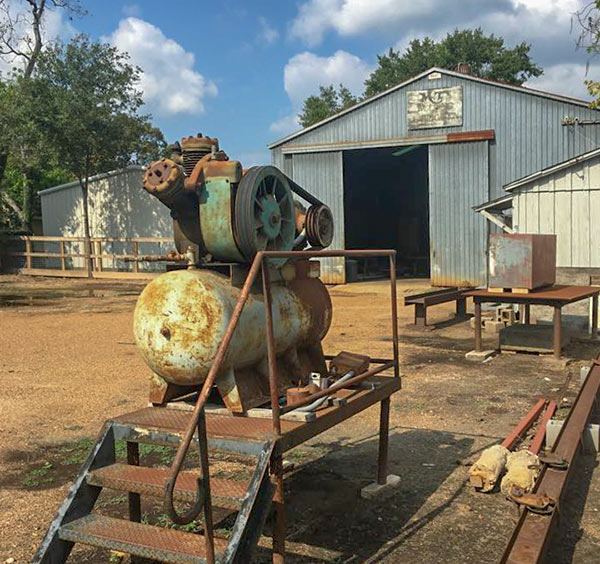 Construction began earlier this month, reports Jen Para, on a 1,600-sq.-ft. brewhouse for Walking Stick Brewing Co. in Garden Oaks. Also on tap for the 16,948-sq.-ft. site at 957 Wakefield Dr., pictured above from the back, which faces Judiway: a 3,600-sq.-ft. bar and patio featuring the brewery’s 7 beers, each of which is named after a peak in the Rocky Mountains. Walking Stick will sit directly across the street from the volleyball courts at Wakefield Crowbar and its neighboring Great Heights Brewing Co. microbrewery. Petrol Station is at the end of the block, at Golf Dr. [Houston Business Journal] Photo: Walking Stick Brewery
Construction began earlier this month, reports Jen Para, on a 1,600-sq.-ft. brewhouse for Walking Stick Brewing Co. in Garden Oaks. Also on tap for the 16,948-sq.-ft. site at 957 Wakefield Dr., pictured above from the back, which faces Judiway: a 3,600-sq.-ft. bar and patio featuring the brewery’s 7 beers, each of which is named after a peak in the Rocky Mountains. Walking Stick will sit directly across the street from the volleyball courts at Wakefield Crowbar and its neighboring Great Heights Brewing Co. microbrewery. Petrol Station is at the end of the block, at Golf Dr. [Houston Business Journal] Photo: Walking Stick Brewery
Tag: Bars and Clubs
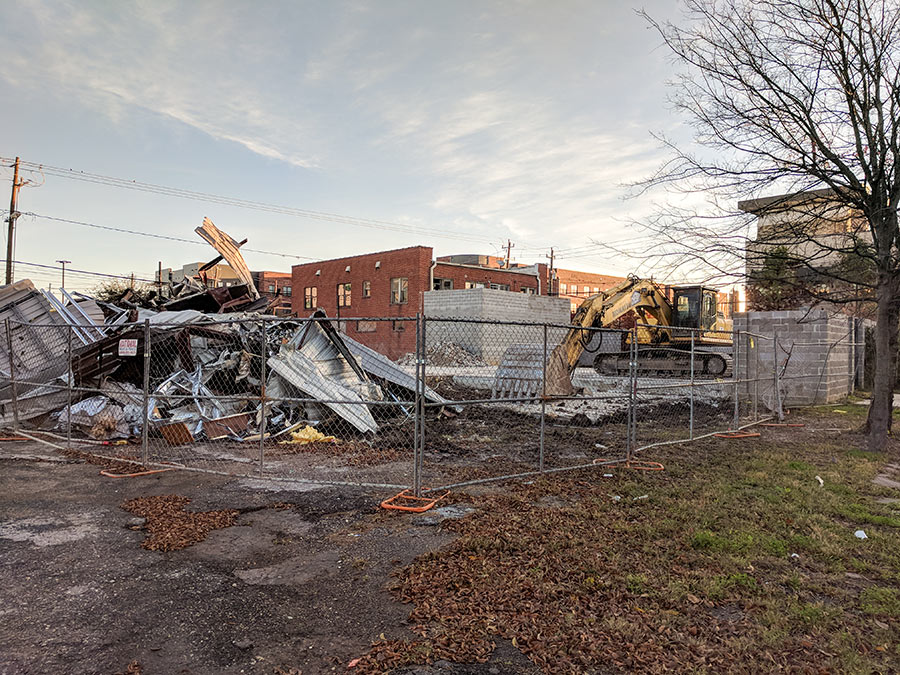
The pile of mangled disco parts beyond the fence pictured at top is all that remains of the less-than-2-year-old La Roux nightclub building at 4011 Washington after crews brought down the house last week. In March, a real estate company connected to Zadok Jewelers bought the entire 39,000-sq.-ft. block on Washington between Leverkuhn and Jackson Hill St. La Roux was evicted earlier this year.
The club’s entrance was off Leverkuhn:
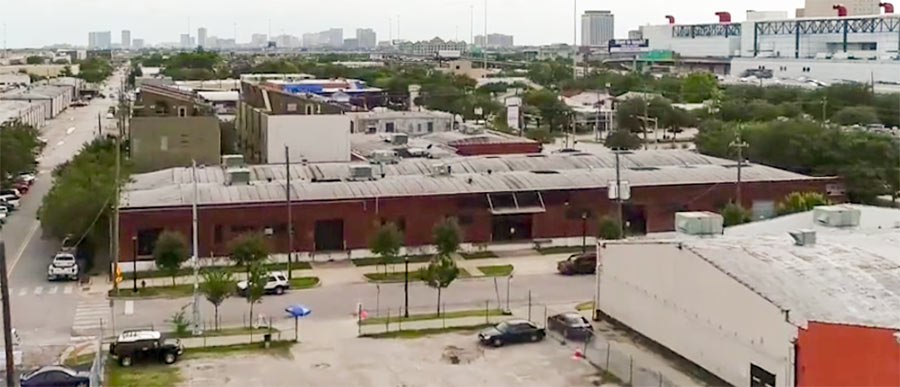
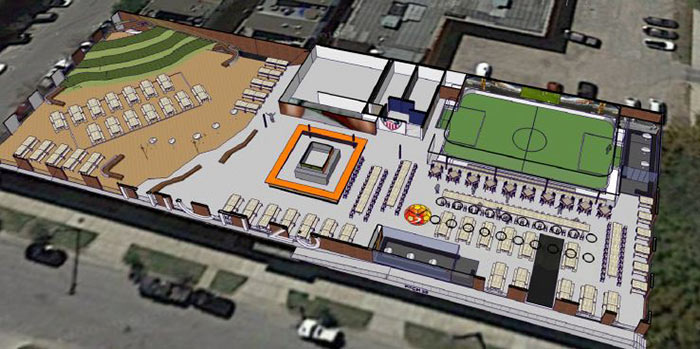
Interior demo work is mostly complete on a 75-year-old single-story brick warehouse lining Walker St. in East Downtown, ahead of its opening next spring as what its promoters are calling Houston’s premier soccer bar and restaurant. What might confer premier status on this venue, called Pitch 25Â — beyond its location across the street from BBVA Compass Stadium? Perhaps the presence of an actual indoor soccer field inside, hosting league play.
Among the transformations planned for the 25,000-sq.-ft. structure in its coming rehab: knocking a large hole in the roof off the building’s Hutchins St.–facing west end — to let sunlight and rain into an outdoorish beer garden planned for the interior. Also, to provide sunlight for the interior trees:
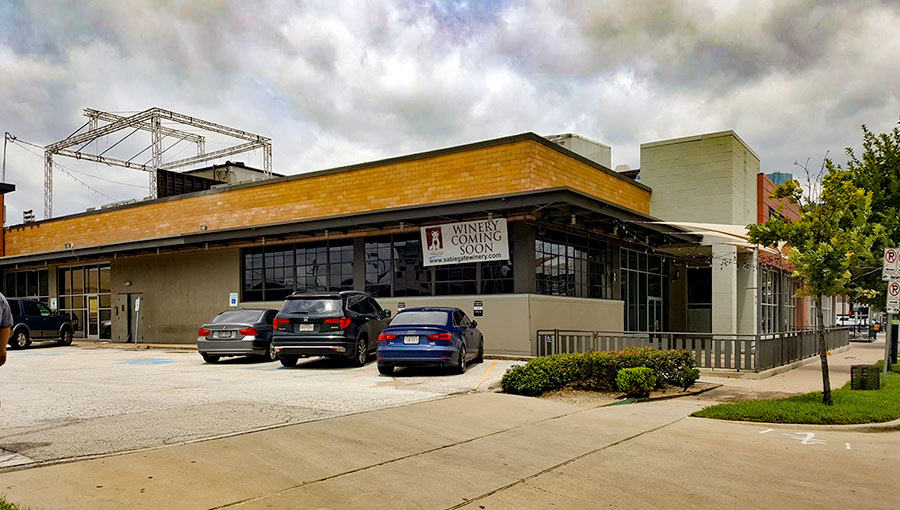
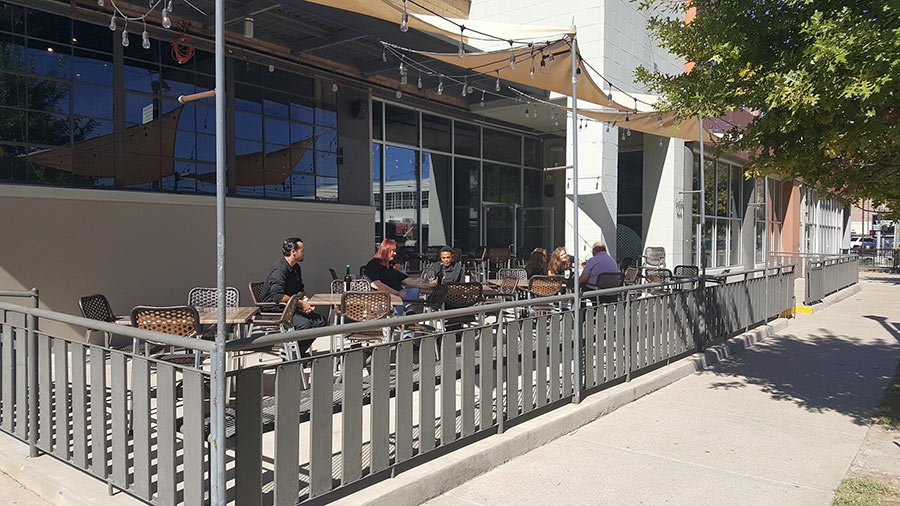
Sable Gate Winery, a local affiliate of the Waters Edge chain of franchised vineyard-less wineries, has its grand opening tomorrow at 2600 Travis St., just south of McGowen and behind Reef in Midtown. The new wine spot, which began serving last weekend, took over the space from GAGE Lounge. Customers who want to make, cork, and bottle their own-label varieties at Sable Gate can choose from the chain’s selection of pre-crushed grapes shipped in from more vineyard-friendly climes around the world; if you’re in a greater hurry than the 5 to 7 weeks it normally takes to ferment and blend a batch of imported grape must, you can commandeer one Sable Gate’s already got going — or just order a glass at the bar.
- Sable Gate Winery [Waters Edge Winery]
Photos: Sable Gate Winery
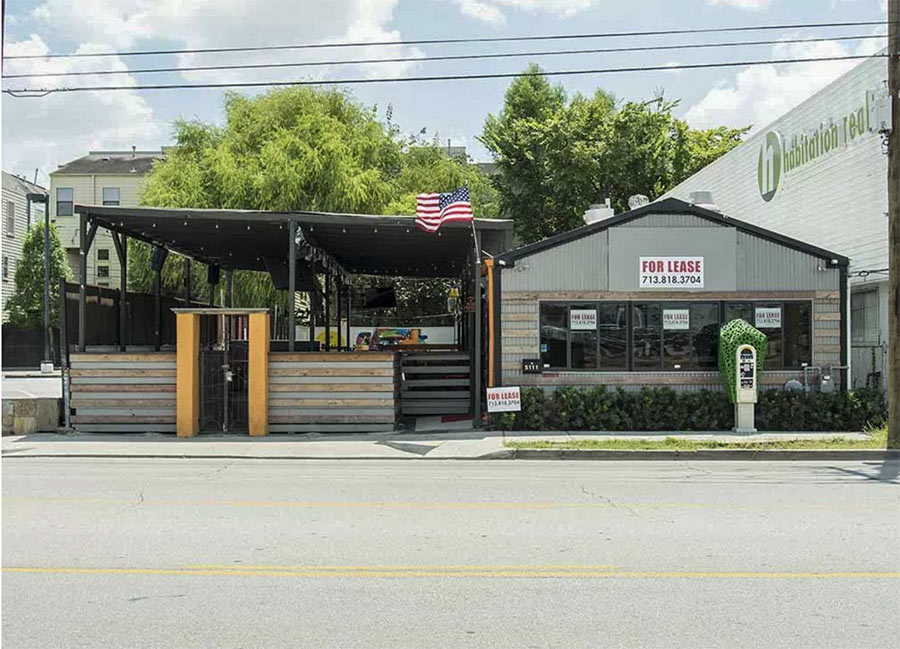
A fourth Candy Shack Daiquiris To Go is planning to open next year on Washington Ave, just 2-and-a-half blocks to the west of the existing W Grill Margaritas To Go drive-thru at Washington and Durham.
Candy Shack is slated to take over the property at 5111 Washington Ave (pictured above), where Coast Eatery + Bar both opened and closed this year. (The property was listed for lease in August.) Before Coast’s tenure, the space was occupied by itinerant Mexican-food joint Taqueria La Macro.
There’s much more than just a drive-thru going into this location, however: The Washington Ave Candy Shack will include a bar, for drinkers not speeding off to their next appointment.
- Classic Flavors [Candy Shack Daiquiris To Go]
Photo: LoopNet
COMMENT OF THE DAY: WE TRIED THAT NO PARKING REQUIREMENTS THING BEFORE, IN AVONDALE 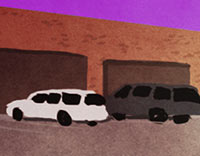 “The urban fantasists who don’t believe in minimum parking should school themselves on the economic concept of the free rider and the common law concept of nuisance. They should also research a little of the history behind Houston minimum parking requirements. These regs did not emerge in a vacuum.
I lived in Avondale, in Montrose, during the nineties, when it was home to no less than nine bars, multiple restaurants, and other adult businesses, all without parking and no parking requirements. Houston minimum parking requirements arose because of what was going on in Avondale and a few other neighborhoods inside the Loop.
The patrons of these bars and restaurants did not and still do not live within Avondale. They all drove to Avondale because there was and is still no other way to get there. The bar owners did not provide parking, choosing instead to impose the costs of their patron parking on the city and the residents of Avondale (free rider). The patrons parked, imbibed, and then proceeded to be drunken asses all night disturbing the peace of the neighborhood (nuisance).
Forcing the business owner to bear the costs of patron parking shifts the costs back to the business which benefits from the patronage. It is a reasonable requirement. It also alleviates the nuisance issue by keeping the drunks off the property of other businesses and residences.” [Jardinero1, commenting on Comment of the Day: What Parking Requirements for Bars Really Encourage] Illustration: Lulu
“The urban fantasists who don’t believe in minimum parking should school themselves on the economic concept of the free rider and the common law concept of nuisance. They should also research a little of the history behind Houston minimum parking requirements. These regs did not emerge in a vacuum.
I lived in Avondale, in Montrose, during the nineties, when it was home to no less than nine bars, multiple restaurants, and other adult businesses, all without parking and no parking requirements. Houston minimum parking requirements arose because of what was going on in Avondale and a few other neighborhoods inside the Loop.
The patrons of these bars and restaurants did not and still do not live within Avondale. They all drove to Avondale because there was and is still no other way to get there. The bar owners did not provide parking, choosing instead to impose the costs of their patron parking on the city and the residents of Avondale (free rider). The patrons parked, imbibed, and then proceeded to be drunken asses all night disturbing the peace of the neighborhood (nuisance).
Forcing the business owner to bear the costs of patron parking shifts the costs back to the business which benefits from the patronage. It is a reasonable requirement. It also alleviates the nuisance issue by keeping the drunks off the property of other businesses and residences.” [Jardinero1, commenting on Comment of the Day: What Parking Requirements for Bars Really Encourage] Illustration: Lulu
COMMENT OF THE DAY: WHAT PARKING REQUIREMENTS FOR BARS REALLY ENCOURAGE 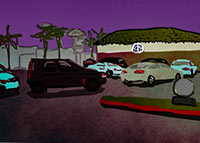 “Uggh . . . Every thread on here, or nextdoor, etc., about a new bar or restaurant attracts an inevitable ‘where will all these people park?‘ comment.
Why do people feel the need to drive to this bar, and the others in the vicinity? Because our obsession with parking requires every bar or restaurant to dedicate 3/4 of their land area to machinery storage, making everything so far apart you can’t walk anywhere.
Wouldn’t it make more sense to PROHIBIT bars from having parking lots, instead? Why does our city REQUIRE bar operators to subsidize one of the most dangerous and reckless activities people regularly engage in — drinking and driving — by forcing bars to provide parking for their patrons? Wouldn’t you rather the bars in your neighborhood made it as difficult as possible for people to drive there, and take an Uber instead?
Let’s keep the drunks off our streets: Zero out the parking minimum on any establishment with an on-premise liquor license.” [Angostura, commenting on The Up-Scaled Bungalow Bar Now Puffing Up in Shady Acres Across from Cedar Creek] Illustration: Lulu
“Uggh . . . Every thread on here, or nextdoor, etc., about a new bar or restaurant attracts an inevitable ‘where will all these people park?‘ comment.
Why do people feel the need to drive to this bar, and the others in the vicinity? Because our obsession with parking requires every bar or restaurant to dedicate 3/4 of their land area to machinery storage, making everything so far apart you can’t walk anywhere.
Wouldn’t it make more sense to PROHIBIT bars from having parking lots, instead? Why does our city REQUIRE bar operators to subsidize one of the most dangerous and reckless activities people regularly engage in — drinking and driving — by forcing bars to provide parking for their patrons? Wouldn’t you rather the bars in your neighborhood made it as difficult as possible for people to drive there, and take an Uber instead?
Let’s keep the drunks off our streets: Zero out the parking minimum on any establishment with an on-premise liquor license.” [Angostura, commenting on The Up-Scaled Bungalow Bar Now Puffing Up in Shady Acres Across from Cedar Creek] Illustration: Lulu
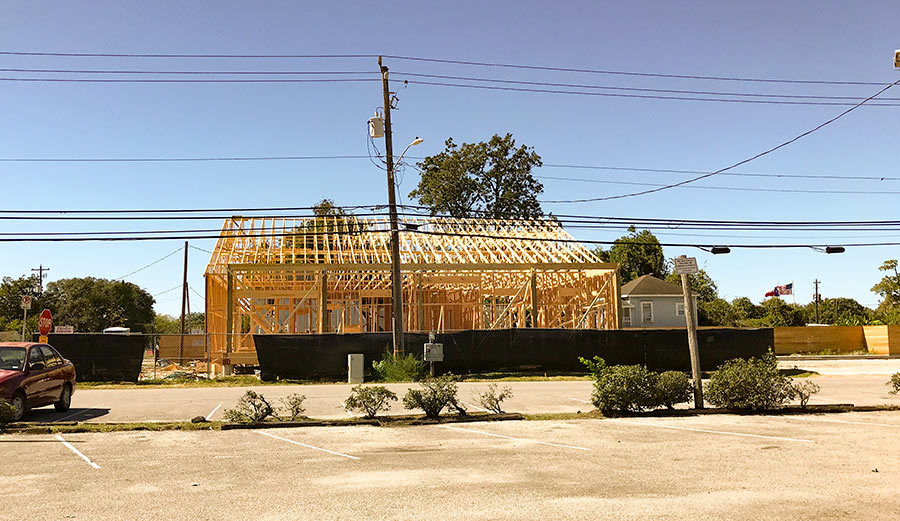
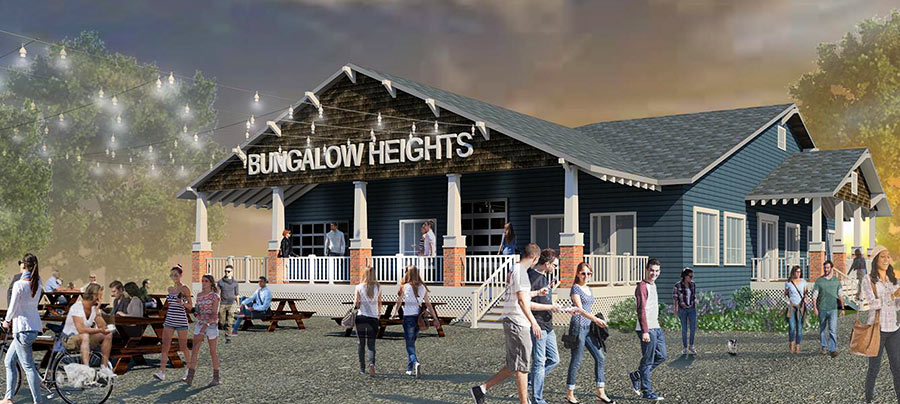
This exterior rendering of Bungalow Heights, the new bar-restaurant going up at 1919 Beall St., the former site of Air Cool and the Junk Goes Green recycling center one block west of the Cedar Creek Bar & Grill on 20th St., shows a building with a lot of bungalow parts assembled in somewhat bungalow-ish fashion, being patronized by what appear to be normal-sized humans. But take a close look at the scale of the thing in proportion to the surrounding figures — and the actual framing now up on the site pictured above — and you’ll soon realize this is a building where every part is probably going to be a whole lot bigger than what it’s modeled after.
For starters, the structure itself measures 5,000 sq. ft. — about the size of the typical lot you might find a bungalow sitting on. This site itself is two-thirds of an acre. Contractor Avan Construction installed the building’s trusses last week with a crane. (The longest truss spans almost 70 ft. and weighs over 400 lbs.) Inside, you’ll find a floor plan significantly different from the typical living-dining-kitchen on one side, bedroom-bath-bedroom on the other arrangement of an unexpanded bungalow:
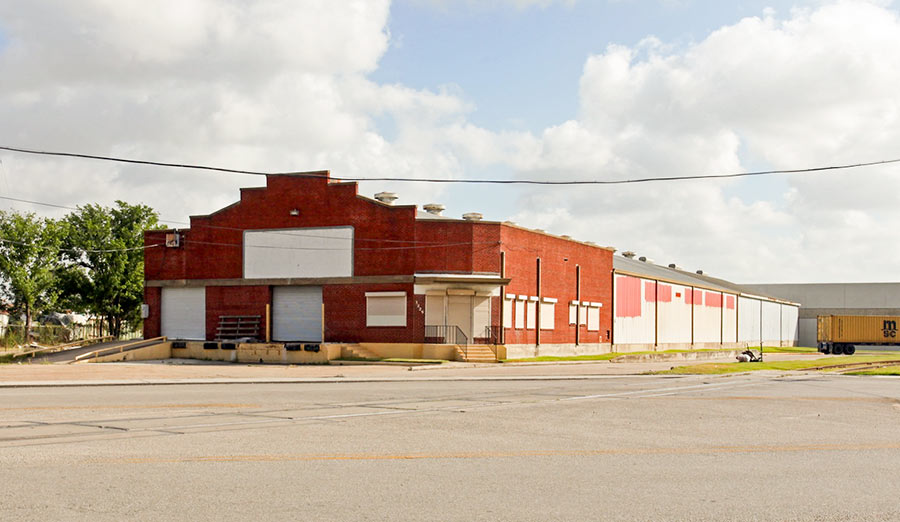
The new bar planned for the 20,878-sq.-ft. warehouse at 3229 Navigation Blvd. in Houston’s East End that earlier this decade was home to Fred’s Trailer Truck Supply will be called Straylight Run and serve — according to its promoters — as Houston’s first-ever “Virtual Reality Bar.” That’s the conclusion of some internet sleuthing by HAIF (and Swamplot) commenter CrockpotandGravel, who after seeing Swamplot’s report on the alcohol license procured for the spot at the corner of Navigation and Engelke tracked down the establishment’s website, a (possibly spurned)Â logo proposal, and Instagram feed.
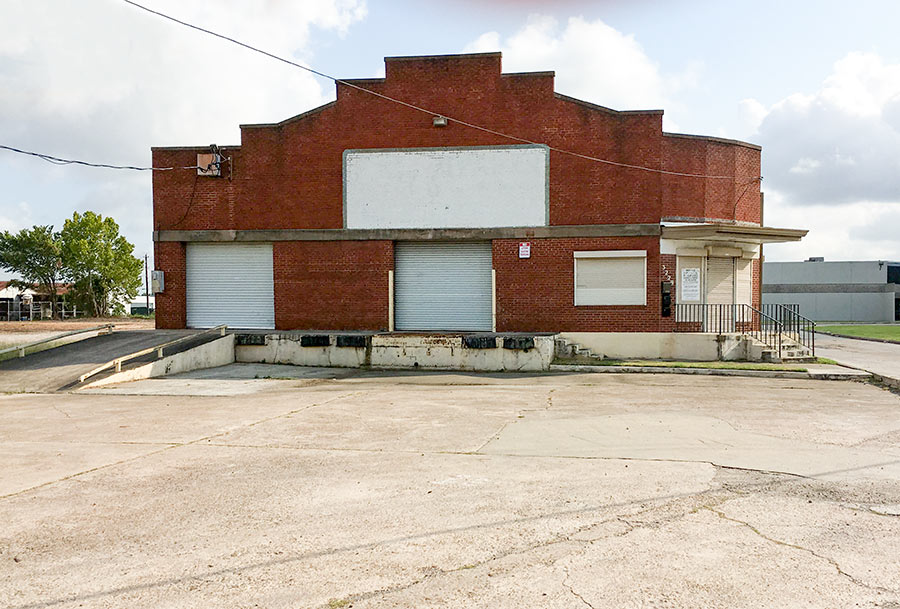
What’s happening at the corner of Navigation Blvd. and Engelke in the East End? A mix of alcohol and demolition: Mixed beverage, late-night, and beverage cartage permits were issued by the TABC last month to a yet-to-be-opened establishment named Straylight in the 20,878-sq.-ft. metal warehouse building with the brick front at 3229 Navigation Blvd. This spot is 4 blocks down the street from Ninfa’s, just past where Navigation starts to curve east toward Buffalo Bayou. Adjacent to that property, excavators are finishing up their work demolishing the former General Supply & Equipment Co. building at 3203 Engelke St.
The newly vacant lot now spreads just to the north of the building where Straylight is planned, as shown in these photos taken by Swamplot reader Johnny Mann Jr.:
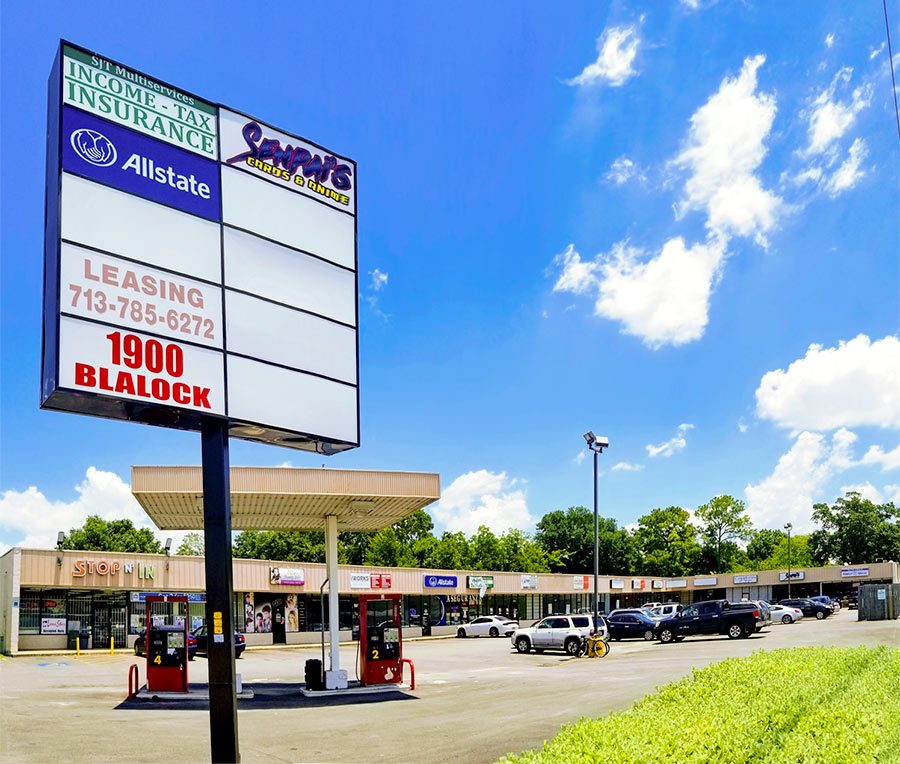
“We will not have a kitchen ourselves,” writes the proprietor of Cobble & Spoke, the new craft beer bar planned for space H, almost to the corner of the 1900 Blalock strip center at the northeast corner of Blalock St. and Campbell Rd., in response to a reader query earlier today on Facebook. “However there is a restaurant on site that you will be able to order with right at the bar & have the food delivered right to your table!” That restaurant is Simply Greek, just 6 storefronts down the L, past Precisions Research, a couple of vacant spaces, Ideal Furniture, Creatures of Yoga, and Senpai’s Cards.
At the opposite end of the center is the Stop n’ In convenience store paired with the pair of gas pumps that front the parking lot. Cobble & Spoke promises a selection of wines and craft ciders as well. Neighborhood riders who want to lock up their bicycles will be accommodated too, the bar’s owner notes: “We will have a bike rack out front & even some dedicated space inside.â€
- Cobble & Spoke [Official site]
- Progress! Super exciting – just another step closer to being Spring Branch’s newest craft beer bar! [Facebook]
Photo: Silvestri Investments
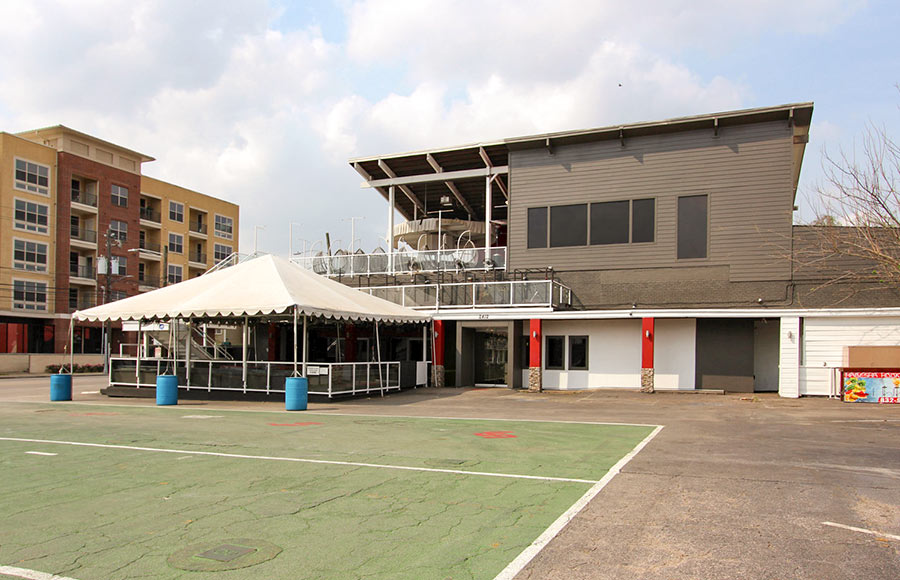
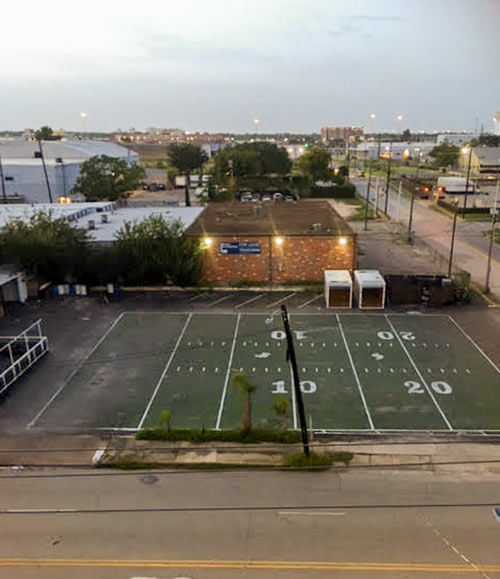
One clue that the Social Junkie Sports Bar has come to the end of its almost-4-year run at the northwest corner of Washington Ave and Sawyer St.: The end-zone-styled valet parking lot pictured in the above recent photo is empty — all the way to the 25-yard line. Another clue: the “It’s been real . . . we out” goodbye notice posted to the establishment’s Instagram feed over the weekend. A reader tells us the place is shuttered and everything inside has been “thrown away.”
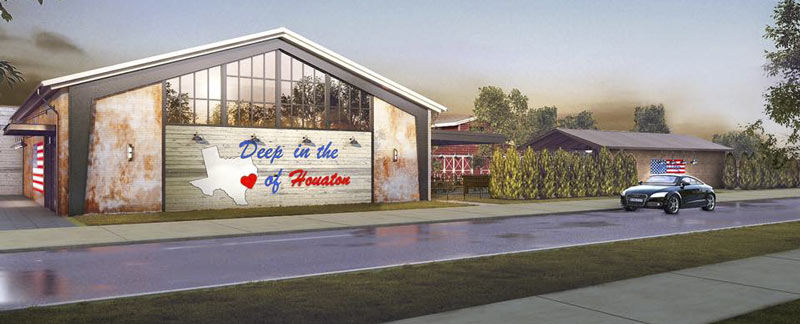
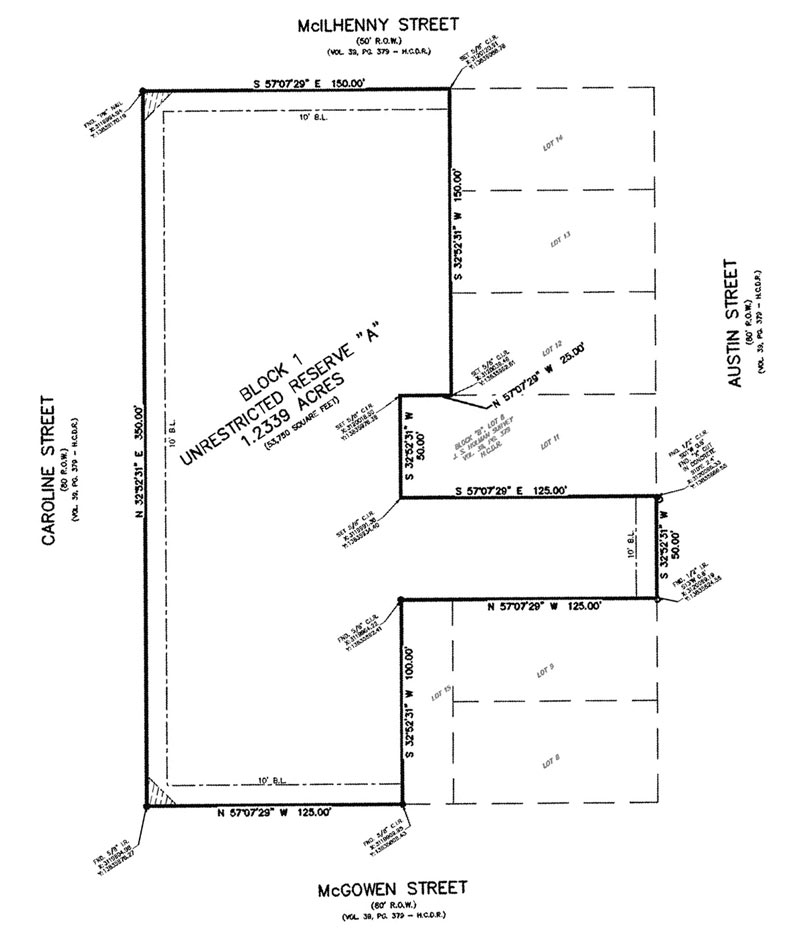 The Dallas-based real estate and restaurant developers at Syn Hospitality Group are hoping to have a Houston branch of flag-slathered bar and restaurant America Gardens open later this year (as rendered above), part of their in-the-works Midtown Common development over on Caroline St. just north of McGowen. The group went after some early city approvals earlier this year to bundle together a handful of property parcels on the block into the edgy unreserved shape shown above. That footprint, mostly sticking along Caroline but stretching across to claim a bit of frontage on Austin St. as well, leaves out the buildings occupied by Core Church Midtown, which is squeezed between the auto and auto accessory pairing of Fast Traffic Auto Work and Austin Radio and Speedometer.Â
The Dallas-based real estate and restaurant developers at Syn Hospitality Group are hoping to have a Houston branch of flag-slathered bar and restaurant America Gardens open later this year (as rendered above), part of their in-the-works Midtown Common development over on Caroline St. just north of McGowen. The group went after some early city approvals earlier this year to bundle together a handful of property parcels on the block into the edgy unreserved shape shown above. That footprint, mostly sticking along Caroline but stretching across to claim a bit of frontage on Austin St. as well, leaves out the buildings occupied by Core Church Midtown, which is squeezed between the auto and auto accessory pairing of Fast Traffic Auto Work and Austin Radio and Speedometer.Â
The group has released a few renderings of the first planned restaurant’s red-white-and-blue-bedecked interior, as well as its large outdoor patio:
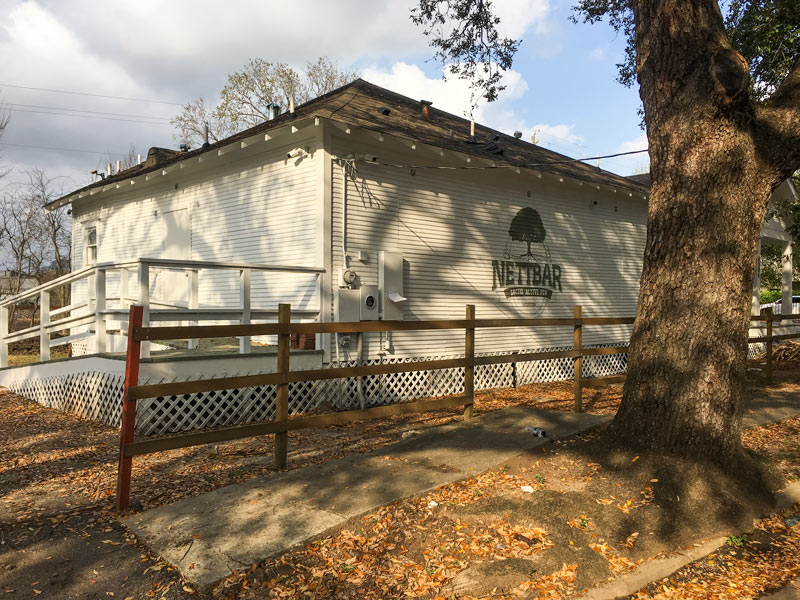
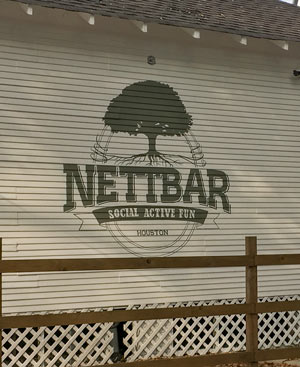 The little house on the angular 10,000-sq.-ft. lot along Patterson St. (wedged between Nett St. and the railroad tracks that run along scattered segments of Allen St.) is looking more like a bar these days, now that a tentacled tree logo has been applied to the side of the building. That logo doesn’t match the name originally picked for the spot on its TABC application — Mission Athletic Club and Drinkery — but a few other aspects of the plan have likely changed since 2015 as well, given the handful of revisions to the house-to-bar conversion plans on file with the city (the most recent of which dates to January).
The little house on the angular 10,000-sq.-ft. lot along Patterson St. (wedged between Nett St. and the railroad tracks that run along scattered segments of Allen St.) is looking more like a bar these days, now that a tentacled tree logo has been applied to the side of the building. That logo doesn’t match the name originally picked for the spot on its TABC application — Mission Athletic Club and Drinkery — but a few other aspects of the plan have likely changed since 2015 as well, given the handful of revisions to the house-to-bar conversion plans on file with the city (the most recent of which dates to January).
Some digging around has been going on in the property’s yard of late:
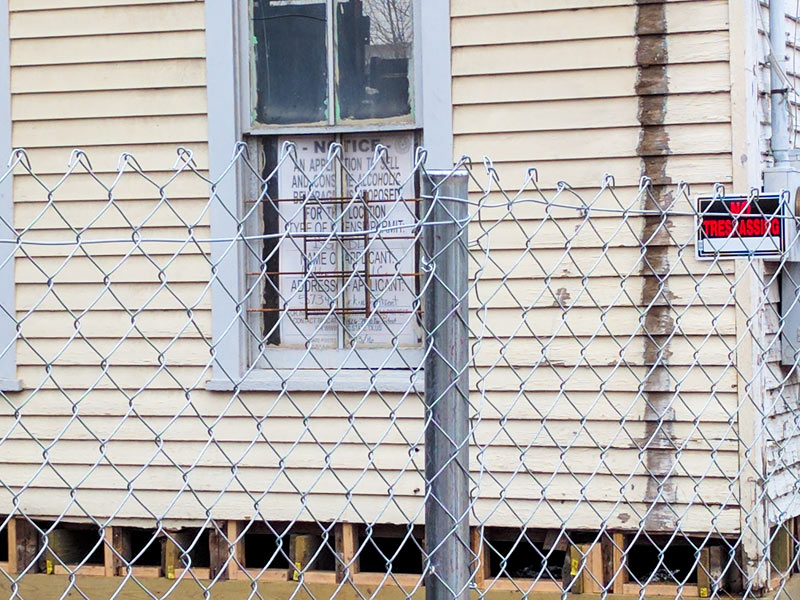
Behind the window bars and No Trespassing sign at 5734 Larkin St., a TABC application notice has been hanging out lately, a reader notes. The posting, which mentions the trade name Hidden Goods and denotes a request for late hours and beer and wine sales in the former home, is 2 doors down the street from residence-turned-cocktail-bar Down the Street at 5746 Larkin; other nearby hotspots on the block include the Iglesia Bautista Hosanna and the Larkin Street Baptist Church. The bar-to-be’s published legal notice from mid-December sports the name of Down the Street owner Cheryl Crider, who also opened opened bar-slash-coffee-shop Around the Corner in East Downtown back in 2015.
Photo: Swamplot inbox

